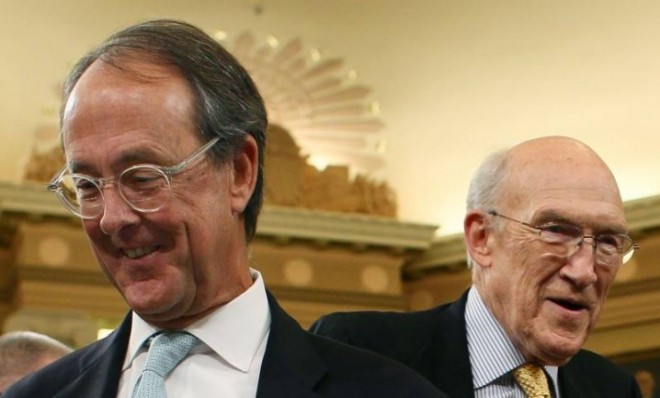Simpson-Bowles 2.0: Is the new bipartisan deficit plan too conservative?
The highly regarded duo are asking for more spending cuts and fewer revenues


Alan Simpson and Erskine Bowles, the co-chairmen of President Obama's bipartisan deficit reduction panel, earned the good regard of centrist pundits in Washington, D.C., for proposing a fairly balanced plan in 2011 that included both new tax revenues and spending cuts. But a balanced plan was not to be: Obama's negotiations that year with House Speaker John Boehner (R-Ohio) to reach a grand bargain foundered on their inability to reach a compromise. Still, the Simpson-Bowles plan endured as a rare beacon of common sense shining through the partisan miasma in Congress, and the two men have come to be seen as authorities on budget matters. As Steve Benen at The Maddow Blog explains:
[T]he original goal of Simpson and Bowles was to spread the pain around, creating a plan that neither side would love, but which would tried to make everyone feel the pinch in roughly the same quantities. Democrats and Republicans would complain, but they could stomach the package, the argument went, knowing that their rivals were sacrificing just about as much as they were. [MSNBC]
Now, Simpson and Bowles have returned with a new plan, on the eve of $1.2 trillion in scheduled spending cuts — known as the sequester — that will hit the Defense Department and discretionary spending programs. President Obama has called on Congress to pass a stopgap measure of modest spending cuts and new revenue, while Republicans have demanded that Obama replace the sequester solely with spending cuts to both discretionary and entitlement programs. Some have already hailed the return of Simpson and Bowles as a badly needed voice of sanity in the budget debate. The editorial board at USA Today says:
Please, would someone give Alan Simpson and Erskine Bowles an award already!...
The latest plan from Simpson, a former Republican senator from Wyoming, and Bowles, who served as President Clinton's chief of staff, usefully rattles the cages of both parties. Beyond the $2.6 trillion in deficit reduction already enacted, it calls for an additional $1.8 trillion in spending cuts, something Democrats resist, and $600 billion in tax revenue, something Republicans hate. [USA Today]
Liberal commentators, however, have pointed out that the original Simpson-Bowles plan had $1.50 in spending cuts for every $1 of revenues, while its sequel has a $3 to $1 ratio in favor of spending cuts. What happened?
The Week
Escape your echo chamber. Get the facts behind the news, plus analysis from multiple perspectives.

Sign up for The Week's Free Newsletters
From our morning news briefing to a weekly Good News Newsletter, get the best of The Week delivered directly to your inbox.
From our morning news briefing to a weekly Good News Newsletter, get the best of The Week delivered directly to your inbox.
Simpson and Bowles decided to use as their starting points the final offers that Obama and Boehner made to each other during the fiscal cliff talks at the end of 2012. In those negotiations, Obama asked for fewer revenues than what Simpson and Bowles had originally proposed. On the other side, Boehner asked for far more spending cuts than in the Simpson-Bowles plan. In essence, the latest plan from the venerable statesmen occupies the midpoint of what Obama and Boehner had offered, skewing the plan heavily toward spending cuts.
This is the problem of Washington's obsession with centrism, says Greg Sargent at The Washington Post:
[The plan] provides a useful window into the arbitrariness of Beltway conceptions of what constitutes the ideological "center." After all, the Boehner fiscal cliff plan raised taxes only on income over $1 million; the Obama offer raised taxes only on income over $400,000. Both of these are to the right of the balance Obama just won an election on: The expiration of the Bush tax cuts for income over $250,000. Yet these were designated the two ideological outer poles for the purposes of defining the debate. [The Washington Post]
The new plan also shows the extent to which Republican opposition to tax increases has shifted the goalposts, says Jonathan Chait at New York:
If the new Bowles-Simpson plan has any value, it is as a marker in the sheer power of Republican obstinacy. After all, since the first Bowles-Simpson plan came out, President Obama campaigned centrally on raising taxes on the rich as part of a debt-reduction plan and won a surprisingly comfortable re-election. And yet the center of the budget debate has moved sharply rightward. The distance between the first and second versions of Bowles-Simpson are an almost mathematical tabulation of the unequal interest the two parties have in compromising. [New York]
But while liberals may be disgruntled, Simpson-Bowles 2.0 may end up being killed by the side that would benefit the most from touting a supposedly bipartisan plan. Republicans, after all, have vowed not to raise any new revenue — which means the new plan is a non-starter for both parties.
A free daily email with the biggest news stories of the day – and the best features from TheWeek.com
Ryu Spaeth is deputy editor at TheWeek.com. Follow him on Twitter.
-
 Political cartoons for January 28
Political cartoons for January 28Cartoons Wednesday's political cartoons include slipping in the polls, Kristi Noem in trouble, and ICE in the classroom
-
 The Week contest: How now, smart cow?
The Week contest: How now, smart cow?Puzzles and Quizzes
-
 The UK’s supposed Christian revival
The UK’s supposed Christian revivalThe Explainer Research has shown that claims of increased church attendance, particularly among young people, ‘may be misleading’
-
 The billionaires’ wealth tax: a catastrophe for California?
The billionaires’ wealth tax: a catastrophe for California?Talking Point Peter Thiel and Larry Page preparing to change state residency
-
 Bari Weiss’ ‘60 Minutes’ scandal is about more than one report
Bari Weiss’ ‘60 Minutes’ scandal is about more than one reportIN THE SPOTLIGHT By blocking an approved segment on a controversial prison holding US deportees in El Salvador, the editor-in-chief of CBS News has become the main story
-
 Has Zohran Mamdani shown the Democrats how to win again?
Has Zohran Mamdani shown the Democrats how to win again?Today’s Big Question New York City mayoral election touted as victory for left-wing populists but moderate centrist wins elsewhere present more complex path for Democratic Party
-
 Millions turn out for anti-Trump ‘No Kings’ rallies
Millions turn out for anti-Trump ‘No Kings’ ralliesSpeed Read An estimated 7 million people participated, 2 million more than at the first ‘No Kings’ protest in June
-
 Ghislaine Maxwell: angling for a Trump pardon
Ghislaine Maxwell: angling for a Trump pardonTalking Point Convicted sex trafficker's testimony could shed new light on president's links to Jeffrey Epstein
-
 The last words and final moments of 40 presidents
The last words and final moments of 40 presidentsThe Explainer Some are eloquent quotes worthy of the holders of the highest office in the nation, and others... aren't
-
 The JFK files: the truth at last?
The JFK files: the truth at last?In The Spotlight More than 64,000 previously classified documents relating the 1963 assassination of John F. Kennedy have been released by the Trump administration
-
 'Seriously, not literally': how should the world take Donald Trump?
'Seriously, not literally': how should the world take Donald Trump?Today's big question White House rhetoric and reality look likely to become increasingly blurred